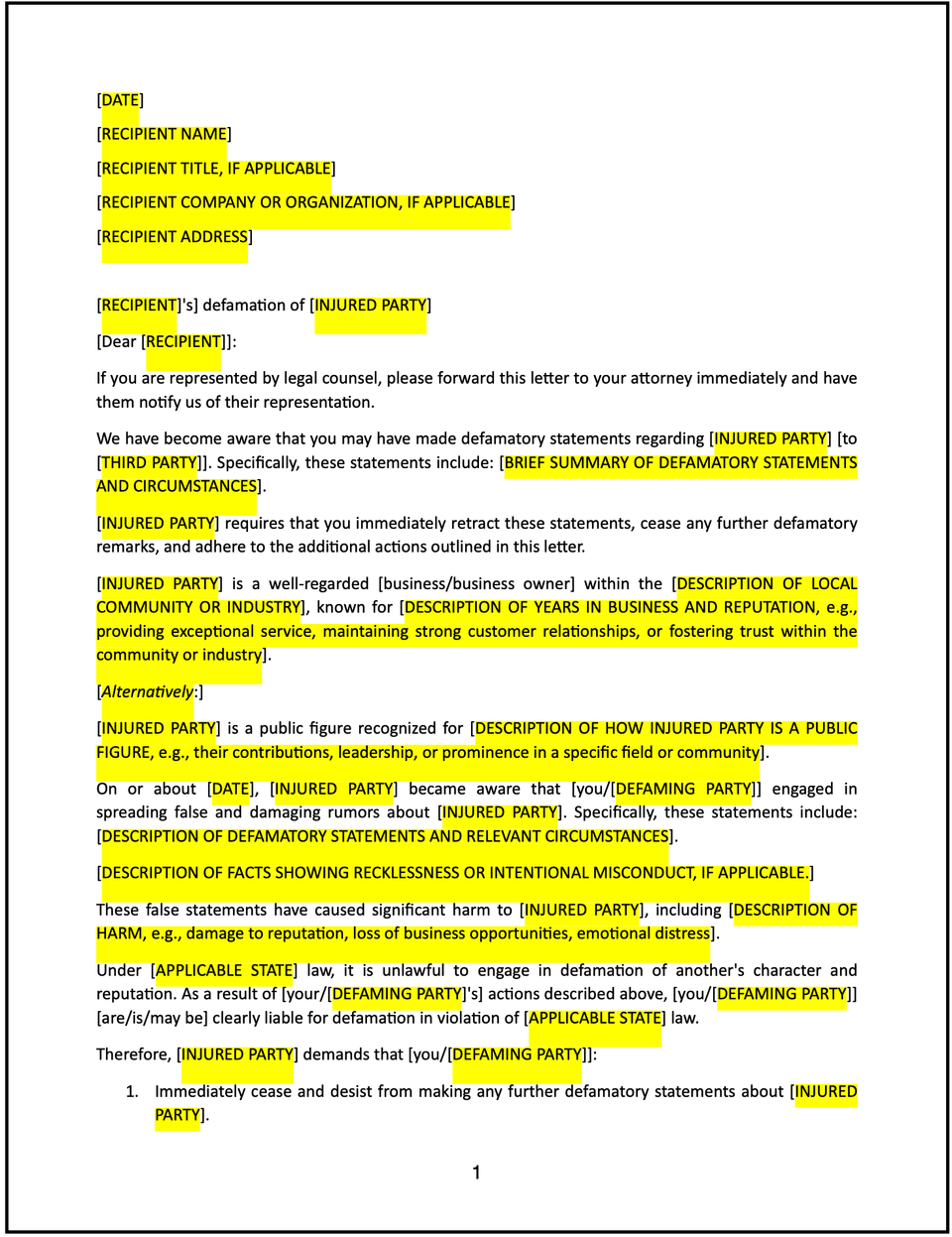Demand letter for withdrawal of defamatory statements: Free template

Demand letter for withdrawal of defamatory statements
A demand letter for the withdrawal of defamatory statements is a formal way to address and resolve instances of defamation while asserting your legal rights. This letter provides a professional approach to request a retraction, cessation of further defamatory activity, and potential remedies.
How to use this demand letter for withdrawal of defamatory statements
- Open with context: Begin by introducing yourself or your organization and referencing the defamatory statements in question.
- Identify the defamatory statements: Clearly outline the specific statements, including when and where they were made or published.
- Assert your rights: State why the statements are false, harmful, and legally actionable under applicable defamation laws.
- Demand withdrawal: Explicitly request a public retraction or withdrawal of the defamatory statements and a cessation of further defamatory activity.
- Specify consequences: Mention that failure to comply may result in legal action to protect your reputation.
- Maintain a professional tone: Ensure the letter is firm yet respectful and focused on resolving the matter amicably.
- Provide contact information: Include your details for confirmation of compliance or further discussion.
Benefits of using a demand letter for withdrawal of defamatory statements
This letter template ensures a structured and professional way to address defamation while fostering resolution and protecting your reputation. Here’s how it helps:
- Protects your reputation: Promptly addressing defamatory statements demonstrates a commitment to safeguarding your integrity.
- Encourages compliance: Clearly outlining the issue and consequences motivates prompt retraction or withdrawal.
- Reflects professionalism: A well-crafted letter reinforces your credibility and seriousness.
- Reduces disputes: Clear communication minimizes misunderstandings and fosters resolution without escalation.
- Provides legal backing: Citing defamation laws establishes authority and strengthens your position.
Tips for writing an effective demand letter for withdrawal of defamatory statements
- Be specific: Clearly identify the defamatory statements, including dates, context, and locations where they were made.
- Use professional language: Maintain a firm but respectful tone to demonstrate seriousness while fostering dialogue.
- Reference laws: Cite applicable defamation laws to reinforce the legitimacy of your claim.
- Set a deadline: Specify a reasonable timeframe for compliance to create urgency.
- Keep it concise: Focus on the key points without overwhelming the recipient with unnecessary details.
Frequently asked questions (FAQs)
Q: What details should I include in this letter?
A: Include the defamatory statements, evidence of their harm, applicable laws, a demand for withdrawal, and a deadline for compliance.
Q: Should I personalize the letter?
A: Yes, addressing the recipient directly and tailoring the content to the specific defamation enhances clarity and impact.
Q: Who typically receives this letter?
A: Send the letter to the individual or entity responsible for making or publishing the defamatory statements.
Q: How formal should this letter be?
A: The tone should be highly professional and assertive to communicate the seriousness of the matter.
Q: When should this letter be sent?
A: Send the letter promptly after identifying the defamatory statements to demonstrate your commitment to protecting your reputation.
Q: Can this letter include legal consequences?
A: Yes, mentioning potential legal action if compliance is not met reinforces the urgency and importance of the demand.
Q: Is acknowledgment from the recipient required?
A: While not required, requesting confirmation of withdrawal or retraction ensures the issue is resolved effectively.
This article contains general legal information and does not contain legal advice. Cobrief is not a law firm or a substitute for an attorney or law firm. The law is complex and changes often. For legal advice, please ask a lawyer.


